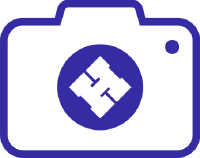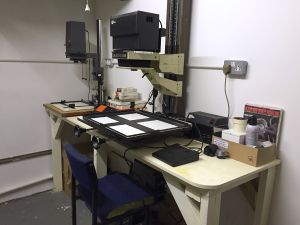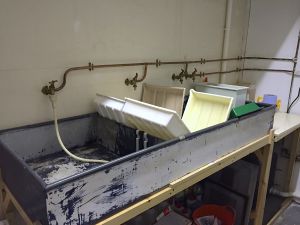Group:Darkroom
| Darkroom | |
|---|---|

| |
| When | TBA, from TBA |
| What | Darkroom |
| Members | |
Where is the darkroom?
The London Hackspace darkroom is located downstairs - entrance is to the right hand side of the lift door.
Who can use it?
The darkroom is open to members of London Hackspace only.
What can you use it for?
- B&W and colour (RA-4) photo printing
- Film development (B&W, C41, E6)
- Film scanning
- Screen printing (facilities still to be built)
- Painting film
- Any other activity that needs darkroom, doesn't use aggressive chemicals and is suitable can be welcome
Facilities & equipment
Enlargers & tools
- De Vere 504 diffuser enlarger with Ilford Multigrade B&W head, works with 35mm, 120 & 5x4 sheet film
- Durst M605 colour enlarger (also works as a nice diffuser enlarger for B&W), works with 35mm & 120 film
- Meopta Magnifax 4 condenser enlarger, works with 35mm & 120 film, comes with set of multigrade filters
- Various focus finders/grain magnifiers
Printing & development tools
- B&W film development equipment (changing bag, processing tanks)
- Paterson Auto Colortherm temperature-controlled film & print processor (up to 12x16"/30x40cm maximum print size)
- Darkroom sink with running cold & hot water
- Print development trays (up to 12x16"/30x40cm maximum print size)
- Paterson fiber-based print washer (like this)
- Paterson high-speed RC print washer (like this)
- Chemical mixing jugs
- Chemical storage bottles
Projection & Scanning
- Nikon Super Coolscan 5000 film scanner - scans 35mm film strips & slides
- 35mm slide projector (model TBC)
Process & consumables
Some paper & chemicals are available for general use thanks to previous donations from hackspace members. Quality or availability isn't guaranteed though, so best to bring your own supplies. If you use some consumables, please consider donating something back to the darkroom.
If you leave paper or chemicals in the darkroom, please label them with your name if you don't want other people to use them. If you want to keep mixed chemicals, please store them in appropriate bottles and label them with your name & date.
B&W print development
| Chemical | Dilution | Minimum processing time | Capacity | Buy | Datasheet |
|---|---|---|---|---|---|
| Ilford Multigrade Paper Developer | 1+9 (100ml to make 1L) | 1 min for RC paper, 2mins for FB papers | 1L can process 100 8x10" RC prints (or 50 FB prints) | Buy | Datasheet |
| Ilford Ilfostop | 1+19 (50ml to make 1L) | 30sec | 1L can process 60 8x10" RC prints (or 30 FB prints) - turns purple when exhausted | Buy | Datasheet |
| Ilford Rapid Fixer | 1+9 (100ml to make 1L) | 1 min for RC paper, 2mins for FB papers | 1L can process 80 8x10" RC prints (or 40 FB prints) | Buy | Datasheet |
As of May 2016, the above can be bought at Ag Photographic for around £33 including delivery. You normally only need to mix up around 1L of each at a time, and stop bath & fixer can be stored and reused as long as they're not exhausted, see datasheets for details.
Stop bath & fixer can also be used for B&W film development, but you'll need to buy a separate developer.
Colour print development (RA-4)
See Group:Darkroom/Colour Printing
Induction & training
If you plan to use the darkroom, feel free to join the mailing list and say hi or ask for help.
Subject to demand, we may be able to offer the following:
- Induction to the darkroom space (get familiar with our equipment if you're already used other darkrooms)
- B&W printing training (if you haven't printed B&W film before)
- B&W film development training (if you haven't developed B&W film before)
Sessions will be announced in the mailing list and listed on the Group:Darkroom/Training Sessions page.
If you want to learn on your own, here are some tutorials available online:
Things that still need doing
If you can help with any of the things below by donating time, money or equipment, please get in touch!
Clean junk & organise the spaceSome way to hang prints/film to dry?And a hairdryer or another way to dry prints?- Get/make a lightbox for previewing negatives/slides
- Get an automatic door closer so that door doesn't stay open (and dust is avoided as much as possible)
- Consider access arrangements - do we need a door lock, ACNode on the enlarger etc.
- Find a way to collect money for spares (e.g. for enlarger and safelight lamps)
- Set up screen printing area (needs a bench to be built in the small corridor outside the darkroom door)
- Schedule some induction and training sessions to get more people interested & skilled in using the darkroom

